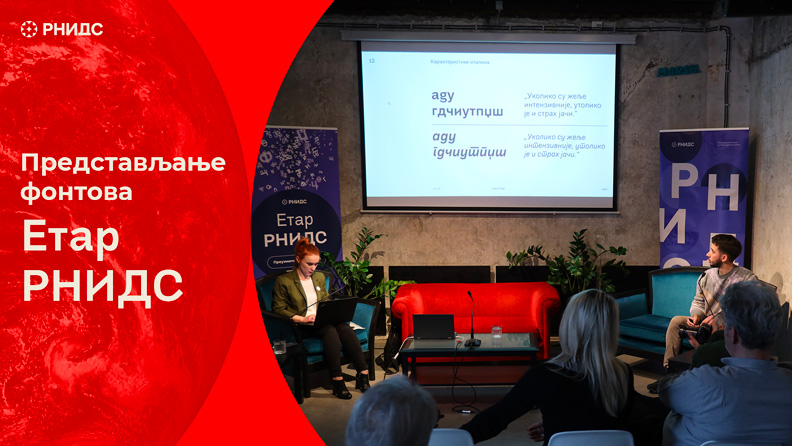To celebrate eleven years since the launch of .СРБ domain registrations, RNIDS held an event to present a new Serbian Cyrillic font, Etar RNIDS, and facilitate debate on the topic of the Serbian language and artificial intelligence.
Speaking on the topic of the Etar RNIDS typeface, which can be downloaded free of charge from the RNIDS website, was its author, Petar Štošić. The author explained that four fonts are available, two normal and two italic, each provided in two weights, more than sufficient both for word processing and for more demanding design applications, both on the web and for print. He explained that he had created them with the idea for them to be embodied in diverse types of design. “Typographically the script is of the grotesque sans serif type, the best-known example of which is Helvetica. However, unlike Helvetica this typeface has been significantly influenced by calligraphy.”
The Etar RNIDS font can be downloaded free of charge from here.

Slobodan Marković, a UN Development Programme digital technology advisor, talked about the COMtext project – an initiative to develop open NLP/NLU (natural language processing and understanding) resources and tools for the Serbian language. He noted that language processing using artificial intelligence was now standard in the IT industry and that we were using AI-based tools on a daily basis for translation and voice control, however, we were using them in English. Insufficient attention has been paid to the Serbian language given the size of the Serbian-speaking community and market. That is why the focus of the initiative he has launched with ReLDI (the Regional Linguistic Data Initiative) is on overcoming existing barriers, those being the development of language technologies almost solely within the academic community, the high initial development costs for companies and the unsystematic approach to development being taken at the institutional level. The objective for the future is to make resources for the development of NLP/NLU solutions available to start-ups, IT companies and other stakeholders. This will have a positive impact not only on business development but also on the preservation of the Serbian language in the digital era. The project has been supported by RNIDS and a number of large Serbian companies operating in the IT sector.
During the event Slobodan Marković spoke to Dana Ludviga from the Latvian domain name registry (.lv) who talked about their project to implement artificial intelligence and computer language processing in developing tools to offer alternate domain names based on the context and meaning of domain name searches.
During the session titled “Serbian language and artificial intelligence”, Slobodan Marković's guests were Vesna Rehner from the company AlfaNum and professor Vlado Delić from the Faculty of Technical Sciences in Novi Sad. Professor Delić provided some explanations and definitions and talked about the development of language and speech technologies over the last 20 years. The audience had a chance to hear how far speech synthesisers have come, a tool that is invaluable to blind or partially sighted users. There was discussion of the complexity involved in developing so-called digital assistants and the multidisciplinary nature of this task, as well as the incredibly broad scope of application of language technologies, from assistive speech technologies for people with disabilities to tools that increase productivity. Speech synthesis is also used as a teaching aid, in traffic information systems (at stations, airports and in public transport), in smart homes and for creating audiobooks, Vesna Rehner explained, to name just a few applications Alfanum had developed for various clients. She talked about the development of voice command and dictation technology. Alfanum had worked on a project of this type with the Pension and Disability Insurance Fund, making it possible to dictate medical diagnoses and with the software even recognising the Latin phrases used in medicine.
All the discussion participants agreed that initiatives involving the Serbian language would have to originate in Serbia, which, given its small size, is not a priority for the global tech giants, and that if in the digital era to come we are not able to communicate with computers using voice and text in the Serbian language, then it will be an era in which we lose our language.